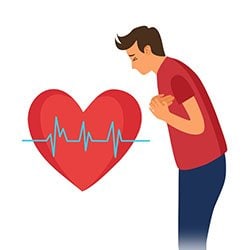This Is What a Heart Attack Really Feels Like
 What Does a Heart Attack Feel Like?
What Does a Heart Attack Feel Like?
When you think of a heart attack, do you think of sudden excruciating pain and clutching your chest? After all, that’s how heart attacks are portrayed in movies and on television. “Hollywood may have you believe that heart attacks are very obvious to spot, but this isn’t accurate. In real life, heart attack symptoms may be far less obvious,” shares PIH Health Physician Van La DO.
Here are more likely signs of a heart attack. If you experience these symptoms, take them seriously and seek medical help right away.
Signs of a Heart Attack
Heart attack symptoms may be severe, but they may also be mild and subtle. In some cases, a person may not even realize they’re having a heart attack. Here are signs to look out for:
- Chest pressure or tightness. Some people describe this feeling as if an elephant is sitting on their chest.
- Pain on the left side of the body. You may experience pain in your chest that radiates down your left arm or into the left side of your jaw. You may also have pain in your neck, shoulder, abdomen or back.
- Heartburn or indigestion-like symptoms. It is common for heart attack symptoms to be similar to those of heartburn or acid reflux. If your pain and discomfort are accompanied by sweating or shortness of breath, or if they persist after taking a heartburn remedy, get medical attention right away.
- Shortness of breath. Some people may only experience shortness of breath without any real chest pain or tightness. While shortness of breath may also be caused by another condition, it should not be ignored.
- Fatigue, nausea and sweating. Women are more likely to experience these subtle symptoms and are less likely to have obvious signs of a heart attack such as chest pain and indigestion-like symptoms.
What should you do if you have any of these symptoms?
“If you experience any heart attack symptoms, it is important to seek medical attention right away. Do not drive yourself to the hospital, even if you think you feel well enough to drive as your symptoms may worsen on the way,” shares Dr. La. Instead, call 911 or have someone drive you to the emergency room immediately. Heart attacks, severe or mild, have the potential to inflict damage on the heart. Seek treatment as soon as possible once a heart attack starts.
To learn more about heart attack symptoms, speak with a cardiologist. Visit, PIHHealth.org/BookCardiology.
Copyright 2023-2024 © Baldwin Publishing, Inc. Health eCooks® is a registered trademark of Baldwin Publishing, Inc. Cook eKitchen™ is a designated trademark of Baldwin Publishing, Inc. Any duplication or distribution of the information contained herein without the express approval of Baldwin Publishing, Inc. is strictly prohibited.